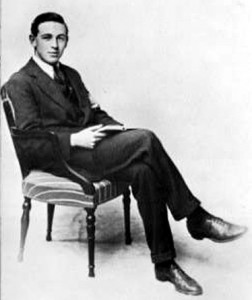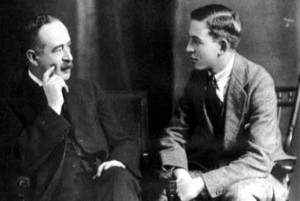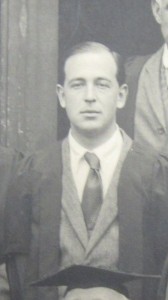Hello all!
I have been on summer break for several weeks, researching while finishing up some house projects. I’m working now on the C.S. Lewis and Leadership book, which I hope to have sample chapters for by the end of the summer.
As many of you know, I have had a prolonged interest in patriarch Albert Lewis for several years. This interest initially originates from dissertation research, while analyzing various forms of leadership that Lewis had encountered during his lifetime, including Albert’s controversial parenting style. I discussed this in some detail in my chapter on Flora Lewis in Women and C.S. Lewis. During a 2014 trip to the Wade Center, I was introduced to the previously-unpublished manuscript “Padaita Pie,” 100 assorted “wheezes” collected by the Lewis brothers about their father Albert (many thanks to Charlie Starr for this!). I was privileged to transcribe this document for VII (Volume 32) last year.
“I think the [photo] of you looking at me is excellent” (Volume 1, 344)
In preparing for a longer work on Albert, I recently reread Volume 1 of the Collected Letters as well as the diary All My Road Before Me, and they were (as always) poignant and illuminating. The letters basically contain correspondence from Lewis’s early life – letters from childhood and adolescence, his time as a WWI solider and student at Oxford, to the first six years as tutor at Oxford. A majority of these letters were written during his pre-conversion years (including his time as an atheist), which may prove uncomfortable for some to read when juxtaposed against the clear, optimistic tone of Narnia and Mere Christianity. Indeed, although imbued with the same high intellect and powerful reasoning Lewis illustrates in his apologetic works, Volume 1 tackles some disheartening and disturbing aspects of Lewis’s character, aspects which would later be redeemed with maturity and a deeper understanding of Scripture. Lewis talks of “prigs”; Lewis was himself a young, rather arrogant young man by his own admission:

“Was led somehow into a train of thought in which I made the unpleasant discovery that I am becoming a prig – righteous indignation against modern affections has its dangers, yet I don’t know how to avoid it either” All My Road Before Me (383)
Yet, these works also display his precociousness. His budding intellect was further nourished in his time with tutor Kirkpatrick (the “Great Knock”). He digested a steady diet of Greek classics, Norse Mythology, and Victorian novels, among other great works. This provides Lewis with training as an exceptional literary critic, and the letters and diary give us an intimate glimpse into Lewis’s prodigious knowledge through his various interactions with literature.
Along with this impressive education, Lewis faced a multitude of challenges. Early in life, Lewis was devastated by the loss of his mother at age nine, as well as the torment of “Oldie” Capron’s poor leadership at Wynyard School in addition to a yawning distance between him and his father. As an adolescent, he experienced a brief reprieve from preparatory school when he studied with Kirkpatrick, but found his late adolescence fraught with problems. There was his poor math performance on Responsions (Oxford Admission Exams), his time as a soldier on the front lines in WWI, the loss of his friend Paddy Moore, the blossoming of a rather unusual relationship with Paddy’s mother Mrs. Moore, the co-habiting with the Moores which stimulated all kinds of domestic turmoil, and his struggle to obtain employment after achieving an unprecedented three firsts – one in Honour Moderations (Greek and Latin literature), one in “Greats” (Philosophy and Ancient Literature), and one in English (this final honor was achieved in one year – an astounding accomplishment considering the issues he was experiencing at home, but more on that later). Perhaps his most distressing challenge in these early years was the rivalry between the religious beliefs he possessed as a child and the nagging doubt which his blooming rationality tended to dismiss.
The Collected Letters and the diary give us significant insight into Lewis’s spiritual and intellectual development. We see him grow into a man sobered by struggle, but we also witness the steady progress leading to his academic success, as well as the nurturing of his imagination and his acceptance of the Christian faith.
After reading both books simultaneously, I thought, what a great idea for a blog series!
I haven’t completed a blog series since 2013 (YES, FOUR YEARS!) when I completed the 12-part series on Lewis and Women. This series will feature six posts. Unlike last time, I will NOT reveal the topics until they post. *cue suspense*

